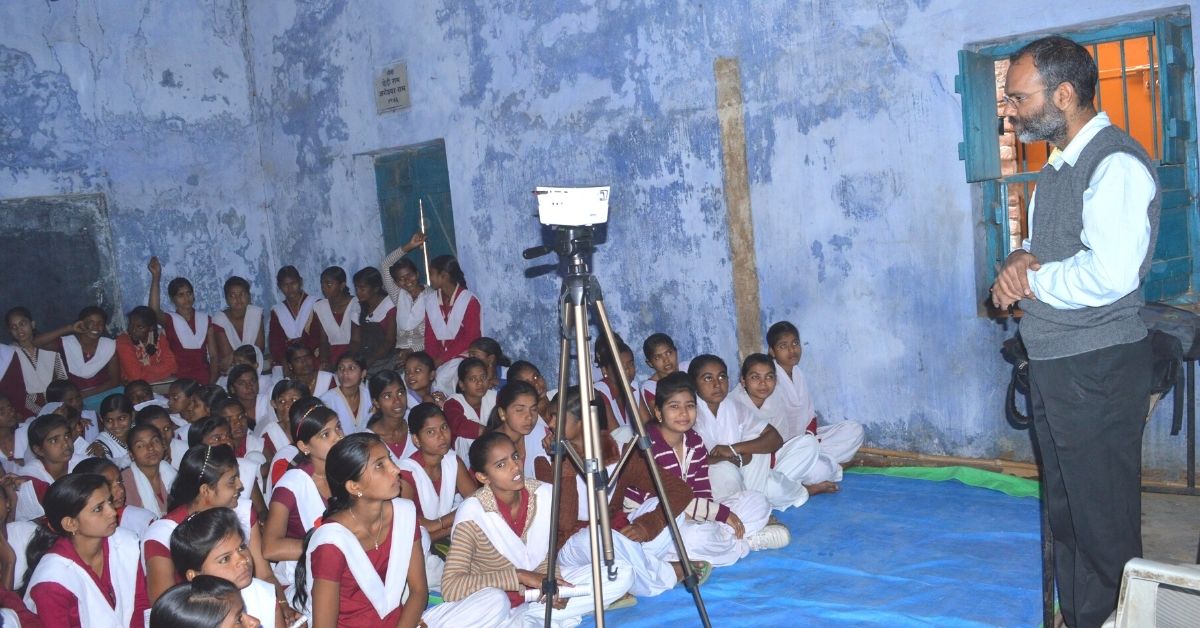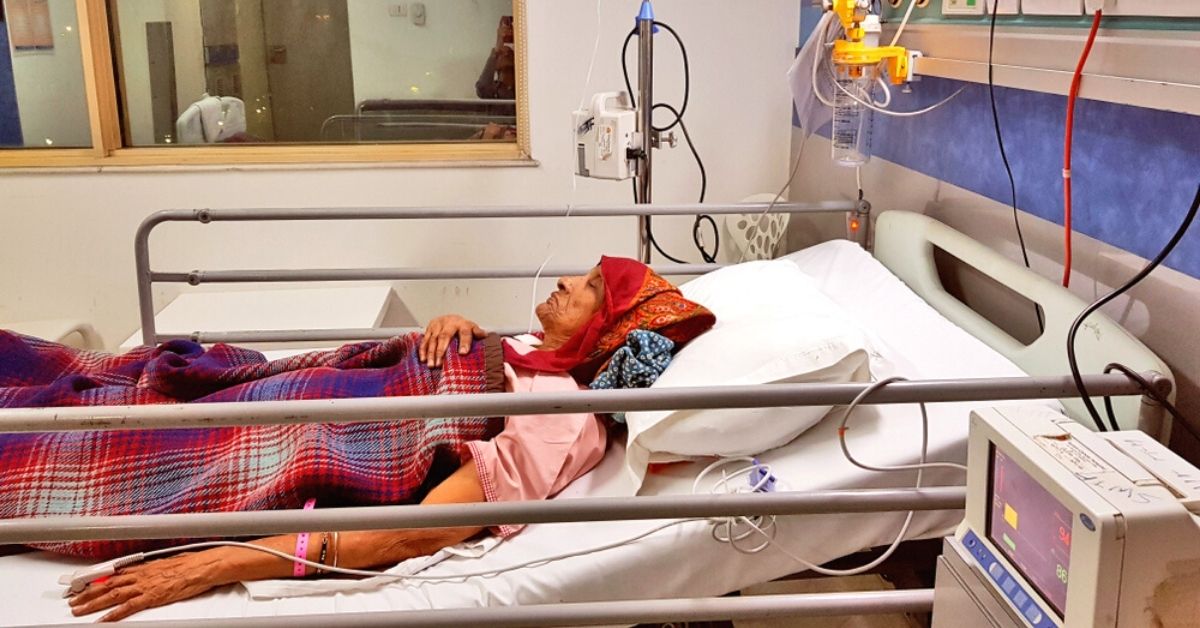The first Saturday of each month sees hundreds of residents from Jamuhar, Dehri, and other neighbouring villages in Bihar queuing up at the Narayan Medical college. Some travel over 100 km for this. The monthly affair is not for a blood donation camp or a health check-up drive, but it is a unique event to diagnose and follow-up on cancer treatment.
Among 14 volunteers attending to the visitors is an oncologist named Dr Sunil Kumar. The patients then undergo further diagnoses about their respective medical conditions.
But Dr Sunil travels 1,000 km each month from Dehri to help the underprivileged, and diagnose them, hoping to catch their diseases at an early stage. He works as an additional professor at surgical oncology at All India Institute of Medical Sciences (AIIMS), Delhi.
“There are about 50 visitors during the day, out of which about one-third get diagnosed with some type of cancer. The remaining are follow-up cases of patients who were detected with the disease earlier,” Dr Sunil tells The Better India.

The initiative led by Dr Sunil is entirely free, where the cancer patients receive their diagnosis, the line of treatment and other assistance to treat their diseases. The services are given under the banner of Chandrakanti Devi Cancer Foundation, an NGO. The name is dedicated to Dr Sunil’s mother, a cancer survivor herself.
“My mother is not well educated but has a fair idea about the social work I do, which makes her feel proud,” he says.
He says that the need for the initiative was triggered after his mother was diagnosed with pancreatic cancer in 2012.
“I was in the USA on my way to become a liver transplant surgeon when I heard the unfortunate news,” he says.
The 44-year-old says that he ended his stint in the US to return home for good. “I received an opportunity to join AIIMS and take care of my ailing mother. The pancreatic cancer is termed terrible, and my mother underwent treatment and post-surgery complications. Fortunately, she survived and continues to live her life,” he says.
However, Dr Sunil realised that his mother was lucky to have a son practising medicine and working on cancer treatment. But there are many in the less developed part of India who fail to diagnose cancer in the early stages and access treatment due to unawareness.
Holding Their Hand Through Cancer
“I wasn’t born to a privileged family. My father was a Class 3 government employee, and we never lived a luxurious life. He spent two-thirds of his salary meeting my expenses during my medical studies in Delhi. Like me, there are many in the village facing multiple challenges. The motivation to help the needy rose from the circumstances around me. I wanted to contribute my bit to society,” he explains.
It was then that he decided to start his NGO in 2013. “The aim to start an organisation was to seek help and donations from potential donors. As an individual, it would have been difficult to convince people of my motives as they would have doubted my intentions,” he says.

Dr Sunil and his friends in the fraternity, who shared similar experiences of having some relative or family member diagnosed with cancer, started the NGO.
Explaining the problem about cancer diagnosis, Dr Sunil says, “A major cause for cancer to go undetected in the early stages is the lack of awareness. A patient suffering from a prolonged cough may be suspected of tuberculosis but the doctors and patients will take fewer steps to check for the possibility of lung cancer.”
Citing another example, he says, “The same goes for rectal cancer. The patient may complain about blood in their excreta, but it may be suspected to be haemorrhoids.”
Dr Sunil says that once the possibility of cancer is eliminated, the line of treatment changes and the disease only gets detected during advanced stages. “Moreover, even if the doctors detect cancer among patients, there is no appropriate guidance or path of treatment chalked out for the patients,” he says.
He adds that the medical camps held by the NGO address the very shortcomings and help the patients. “We create awareness among people through workshops at schools, colleges and public places. The locals are informed about cancer and identifying potential symptoms at the early stages,” he says.
Dr Sunil says that once the people find a suspicious lump or abnormal bodily functions, they approach the camps. “The patients undergo tests and investigations with the help of a local hospital. Once cancer gets detected among patients, they are consulted and informed about the next line of treatment. We handhold the patients, explaining about the treatment at private and government hospitals. Patients unable to afford treatment at the private hospital are directed to AIIMS, Delhi, where they can undergo treatment for a more economical price,” he adds.
The NGO also works in tandem with the health workers such as Accredited Social Health Activist (ASHA) workers and Primary Health Centre (PHCs) doctors to increase their reach. “About 50 per cent of the women at the camps are diagnosed with breast or cervical cancer,” he says, adding, “A woman refrains from consulting the health condition with a male doctor, if she identifies a swelling or a lump. But they are comfortable with a female health worker. Hence, we decided to work with the government health workers.”
To enable cancer patients to access quicker consultation with the experts, the NGO has a 24/7 helpline number. “The patients are guided, informed and suggested a line of treatment over the phone by experts. This way, the patients do not necessarily have to wait for the monthly camps. The purpose is early detection of the disease,” Dr Sunil notes.
Since the past eight years, the NGO has helped at least 1,000 patients identify cancer at various stages and seek the much-needed treatment.
The Need To Help More
Saryoo Pandey, one of the beneficiaries of the camp, says, “I was diagnosed with mouth cancer in 2018 during a dental check up. Further tests confirmed the disease. I approached Dr Sunil for guidance who suggested and conducted a surgery at AIIMS, Delhi. Since then, I have recovered and have not experienced health complications.
However, Dr Sunil feels that there is little that he can do for the patients due to various constraints. “Out of the 10 patients that are diagnosed with cancer, only five can afford to seek treatment. The reasons are that many of them cannot afford the travel costs to Delhi, even if it is a free treatment at AIIMS. Some do not have a relative to accompany them. The others are old, and others still are diagnosed with cancer at an advanced stage. These patients are suggested alternative treatments in neighbouring hospitals for palliative care,” he shares.
Dr Sunil says that the foundation has no financial means to help the needy. “I pay for my travel expenses from my pocket. None of the volunteers are paid, and we don’t have a budget to spread awareness about our work through advertisement. Once we can afford it, we will provide financial assistance and a volunteer to travel with the patient. But at present, we do not have a dedicated person to help every patient apply for cancer treatment under government schemes to avail benefits,” he adds.
The doctor believes that help in financial resources could benefit more cancer patients to seek treatment. “Sourcing equipment for conducting tests requires funds, and the finances are a major constraint putting limitations on our work. Additional funds will allow an increase in the frequency of camps and reach more people,” he says.
But for now, Dr Sunil is satisfied to be helping locals from Bihar. “I am glad that my skills and knowledge, along with the volunteers, are helping to achieve collective results in early detection and treatment of this disease,” he says.
To know more or help Chandrakanti Devi Cancer Foundation with monetary aid, click here.
Edited by Yoshita Rao
No comments:
Post a Comment